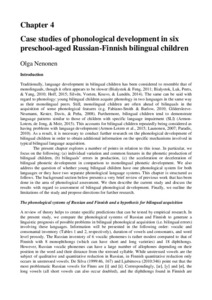Case Studies of Phonological Development in Six Preschool-aged Russian-Finnish Bilingual Children
Nenonen, Olga (2020)
Nenonen, Olga
Teoksen toimittaja(t)
Babatsouli, Elena
Ball, Martin J.
MULTILINGUAL MATTERS
2020
Julkaisun pysyvä osoite on
https://urn.fi/URN:NBN:fi:tuni-202103012310
https://urn.fi/URN:NBN:fi:tuni-202103012310
Kuvaus
Peer reviewed
Tiivistelmä
Language development in bilingual children has been considered to resemble that of monolinguals. Bilingual children also tend to produce language patterns similar to children with specific language impairment (SLI). Bilingual language acquisition is a complex subject, which is still lacking in available empirical evidence. It is important to conduct further research on the topic in order to obtain additional specific information on the mechanisms of typical bilingual language acquisition. The purpose of this paper was to assess the performance of Russian-Finnish bilingual children in the phonological production area. The longitudinal study observes the evidence from 6 typically developing preschool-aged bilingual children. The data, collected through the articulation test in a 2.5-year period, was compared to the production of control groups: Russian monolinguals, Finnish monolinguals and bilinguals with SLI. We focus on the following issues: individual variation and common features in the phonetic production of bilingual children, bilingual errors in pronunciation, the acceleration or deceleration of bilingual phonetic development in comparison to monolingual phonetic development. Despite the considerable individual variation in phonetic production, the findings indicate that although bilinguals show initial similarities with monolingual Russian- and Finnish-speakers, their phonological development is slower, and they make specific bilingual errors and the errors that resemble those of children with SLI. The research provides evidence of language interaction in bilingual phonetic development, e.g. in the form of cross-language phonetic transfer. Though bilingual language acquisition demonstrates predominantly a deceleration, bilinguals showed a few cases of accelerated sound acquisition in Finnish and Russian.
Kokoelmat
- TUNICRIS-julkaisut [16929]
